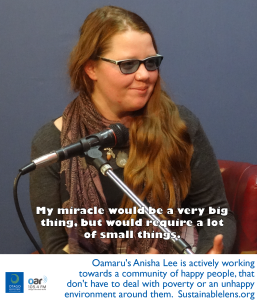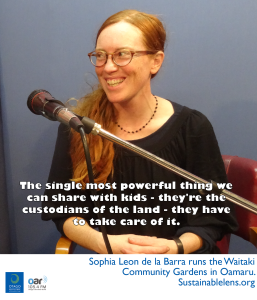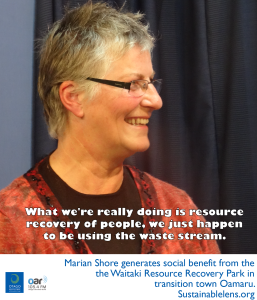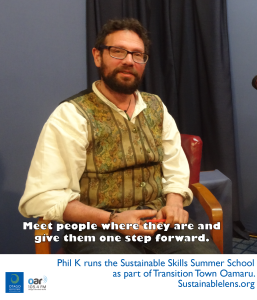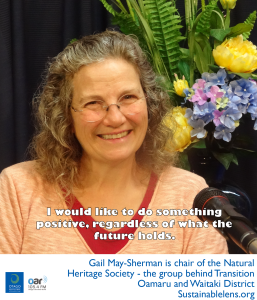
I would like to do the sorts of projects that 30 years down the line, if the world has gone to hell, people will say “thank god we did this”, and if 30 years down the line nothing has gone to hell and everything is fine then people will say “oh my god, I’m so glad we did this”.
Gail May-Sherman is chair of the Natural Heritage Society – the group behind Transition Oamaru and Waitaki District.
Talking points
There’s a group of people here who shared our ideals and really wanted to make a difference.
We need to interact with people – we need to be unified in times to come.
We are preparing out community for changes
Trying to get people to understand that lifestyles need to change and it needs to change pretty rapidly
Realisation that just organic farming wasn’t enough – we need skills
We don’t expect everyone to stand up and be warriors
Whether these changes happen or not, I’m want to able to say I’m so glad we did this.
Our criteria for a course in the Summer School is that it has to help our community either by keeping certain skills in the community, or by helping people reach out and become more connected to each other.
Music brings people together
in the Summer School, we’re not trying to convince anybody of anything, we’re trying to offer things to make sure our community has these skills. Whether these bad things happen in the community or not, it will still make our community a better place.
I would like to do something positive, regardless of what the future holds.
I grew up in Colorado – changes in the climate are much more obvious there than in New Zealand. When I was a little girl, if you planted a garden before the 1st of June, there was a really high probability that you would lose everything to the last frost at the end of May. By the time I left, if I hadn’t planted by garden by the end of April, I wouldn’t get a harvest. Because not only had the frosts left by the middle of April, but by the middle of June temperatures would be 37-40 degrees C, and they would stay that way for three months, with effectively no rain – and watering restrictions because of droughts, extreme droughts. Gardening became an entirely different thing. I have two children. I saw these changes happening to where I grew up. I used to read the newspaper…I saw what was happening with politics and finances, and I saw people around me becoming desperate, living amongst relatively affluent home owners, but still people were struggling, yet the prices of everything were increasing, and there was this tremendous pressure to keep buying. And then we learned about Peak Oil, and the US without cheap oil will be a disaster. So I slowly but surely felt like a person chained to the rail-road tracks and saw the train coming. I felt like myself, and my family, and everyone I loved was in terrible peril, because I couldn’t see any way of making where we lived a place that could survive the kinds of changes that seem to be coming on us. So when we decided to leave, I promised myself that wherever we went I didn’t ever find myself in that position – that I felt totally helpless.
The US is a place that’s on a track and I don’t see it going off – it’s going where it’s going, and I don’t think you can change it – I’d be delighted for someone to prove me wrong. But here you can make a difference.
Anywhere you go, you find the same mix – people who see what is happening and who are afraid and want to do something about it, and people who either don’t see it at all or see it and are afraid and therefore want to pretend it doesn’t exist. I wouldn’t want to speak for anyone, but I do believe that that there are a large number of people who simply choose not to believe it because believing it is too hard, too scary.
We can complain, or we can see opportunities. It behoves us to make the best of the opportunity, because that’s the way it is. Turn challenges into community vision and do something really valuable.
I would like to see Oamaru become a city where community members are connected, and know each other and take care of each another. Where we can supply our own basic needs – our food, shelter and clothing. Where our energy requirements can come from non-polluting – or at least, less polluting – more long term sources.
There are all these challenges about reducing our fossil fuel consumption, while not forcing people to go live in caves – a phrase I hear a lot “you guys just want us to go live in caves” – but that’s exactly what we don’t want. So we would like to see Oamaru use a lot of solar and wind power.
A town like Oamaru has very few energy needs that cannot be met through alternative energy sources if we put our minds to it.
The biggest factor is getting people to remember how to take care of each other – to me that’s the biggest goal, to get rid of that social isolation that is such a part of modern life.
Being old isn’t such a tragedy if you are surrounded by a community that cares for you. being young having children isn’t so difficult if you are surrounded by a community that cares for you.
Pick one project, Get people together even if only half a dozen, and get that project working and visible and strong, and you will get more people interested and eventually you will be able to spread your fingers into other pies. The school connected us to a wide variety of people with a wide variety of skills that have now taken off with other projects – so it helps if your project connects a whole lot of community members to begin with.
(Success?) Summer School, community garden propagation, food forest project. In the last few months we’ve taken on at least five new projects.
(Activist?) Kind of. When I think of activist I think of people who go with signs and protesting – and I do that from time to time. I guess I’m an activist but I do it more with an idea of cooperation. When I think of activist I think of people who are trying to make conflict with a particular source that aggravates them – I am not a very conflict oriented individual….I am activist that works through cooperation rather than conflict.
(Motivation?) the future I see my children having. I watched the Soylent Green dystopian vision when my son was about six months old. In the movie one of the characters is an old man who remembers life back when energy was plentiful and food was plentiful and there was flowers and trees, and it suddenly occurred to me that my son was that old man – he was the generation that was was very likely to be the last ones that would remember that kind of world. Unless we change something dramatically, by the time my son is an old man things could be very much worse. And now my daughter is about to have her first baby. Not only would I like my old age to be relatively pleasant, I would like their old ages to be relatively pleasant too. That’s probably the biggest thing that motivates me.
(Challenges?) Getting our community to recognise a need for a change in the way the economy works. We need to start realising that the emphasis on stuff has to go away. We need to learn to live without growing – you have to learn to live with what you have. The last 150 years of growth brought to us by the fossil fuel industry has been fabulous, but we can’t do that any more. We need to change our priorities so that rather than having more and more and getting bigger and bigger, we can live comfortably with where we are.
(Miracle?) Change in attitude. Having people recognise that we can’t keep exploiting things – we have to live in balance. If I could make the fossil fuels go away in a single whoosh then I would, but only if I could be sure it wouldn’t make everyone’s lives hell. That’s the problem with magic wands – you never know what the consequences are going to be. So I don’t want to say there’s one little thing, but if I could just make people see that we can still live wonderful happy lives, they don’t have to be tarred and horrible and miserable…without constantly getting more stuff. If I could get everyone to see that could be not just as nice but could quite easily be preferable as a lifestyle, that would be the wand that I would wave.
(Advice?) If you think that these issues are a problem then you need to start acting on that, it is time for everyone to act. You don’t have to start whole movements, but you need to start making changes, and you need to start supporting other people in making those changes.
This series of conversations in Oamaru was prompted by discussions with Phoebe Eden-Mann following her OU Geography field trip to explore Oamaru as a transition town.
We are very grateful to the helpful folks from 45 South Television for the use of their studio.
